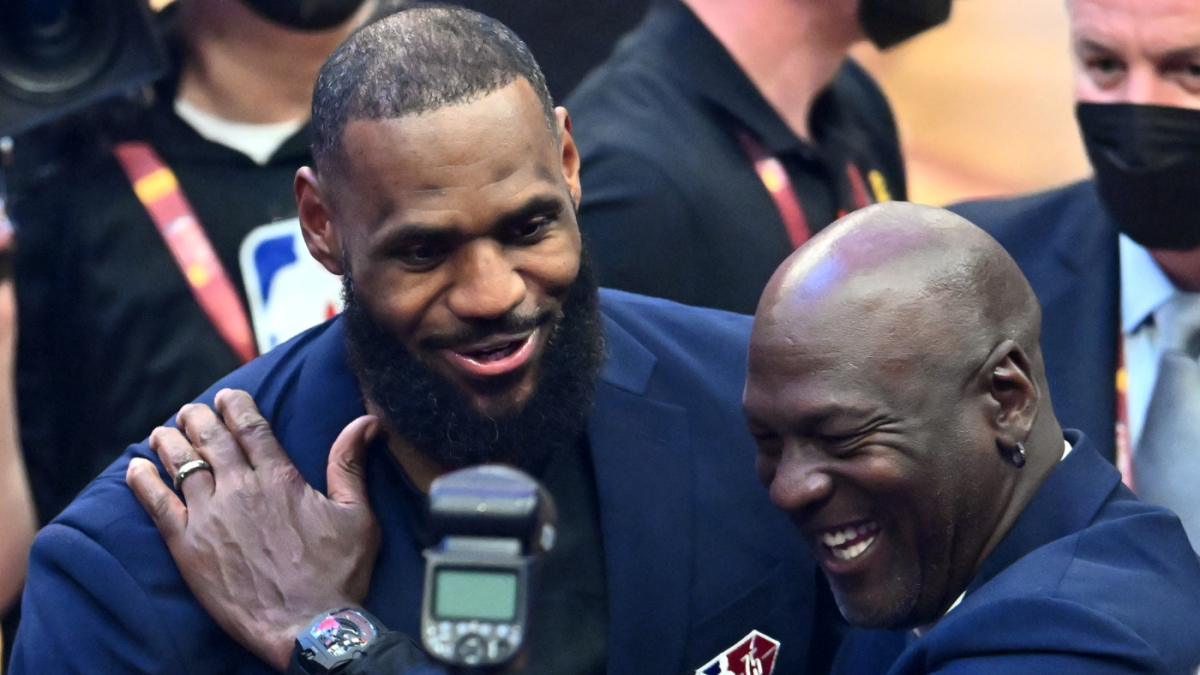Sports
Why LeBron James broke the NBA's all-time scoring record, and why Michael Jordan did not – CBS Sports

Play Now
Football Pick’em
Play Now
College Pick’em
Get Ready for the NFL Season
A Daily SportsLine Betting Podcast
LeBron James and Michael Jordan are the two greatest players in NBA history, but when compared strictly as scorers, Jordan is almost inarguably the superior talent. Jordan averaged 30.1 points per game across 15 NBA seasons compared to “only” 27.2 for James in his 20. At his peak, Jordan averaged over 37 points per game. James has a career-high of 31.4. James is the better passer and rebounder of the two. Defensively, it’s a toss up. But if you need a bucket, you’d take Jordan without thinking twice.
It’s somewhat surprising, then, that Jordan didn’t ever seriously challenge for the NBA’s all-time scoring record. He finished his career roughly 6,000 points behind Kareem Abdul-Jabbar. Yet it’s James who became the top man on Tuesday. Furthermore, he will now presumably tack-on a few more thousand points before he hangs up his Nikes for good, turning a record that most thought would probably never be broken into one that will never be broken. So how did that happen? Why didn’t Jordan, universally considered the greatest scorer in NBA history, break Abdul-Jabbar’s record? Well, there were a few factors at play. In short, circumstances aligned for James in a way that they didn’t for Jordan.
We covered one of the basic explanations for Jordan’s career numbers in the first paragraph. He played 15 seasons. James is at 20 and counting. Two of those Jordan seasons came when he played for the Washington Wizards, after his second NBA retirement when he was well past his physical prime. All told, that means that James has arguably had seven extra seasons of superior physical ability to work with. Some of that is on Jordan. Some of it was merely timing.
Let’s start with the obvious. James reached the NBA at 18. Jordan debuted at 21. Jordan technically could have tried to start his career straight out of high school, but it wouldn’t have been advisable. Moses Malone was the only player to successfully make the jump from high school into professional basketball when Jordan was a teenager, and even he did so in the ABA rather than the NBA. Even if there was more of a precedent for Jordan to follow, he wasn’t exactly a sure thing at that stage of his career.
Jordan didn’t play varsity basketball until his junior year of high school. By that point, James had already been proclaimed “The Chosen One” on the cover of Sports Illustrated. He would have been the No. 1 overall pick for years before he was ultimately eligible to declare. Jordan grew into a top prospect with time, but arrived at North Carolina as a skinny teenager with a broken jump shot. Even if he’d made it to the NBA at 18, he would have needed years of development to grow into a superstar. He averaged over 27 points per game as a rookie, but remember, at the age of 21, James averaged 31.4. LeBron grew up in an era more favorable to high school stars, but he also had significant physical advantages over a young Jordan. That gap closed with time, but it explains the head start James got.
That head start was out of Jordan’s control. However, we should note that he missed his age-30 season and most of his age-31 season due to a mid-career retirement. He retired for good at 35 and skipped his age-36 and age-37 seasons. At his peak, Jordan was scoring roughly 2,500 points per season. Give him all of those years back and he likely sets a record that James would still be chasing.
Here’s a startling statistic: Jordan made only 581 3-pointers in his career. James has made 621 during his time as a Laker alone. James was the more accurate 3-point shooter, making 34.4 percent of his career attempts to Jordan’s 32.7 percent, but that gap is relatively meager. Volume is where the difference starts to add up. James has thus far scored 4,968 more points from behind the arc than Jordan.
Almost all of that can be attributed to volume. James himself has attempted more than triple the number of 3-pointers that Jordan did, but that is largely due to league-wide trends. The average NBA team attempted 12.7 3-pointers per game in Jordan’s final season with the Bulls. Both Stephen Curry and James Harden have had individual seasons in which they’ve attempted that many 3-pointers. The average team in the current NBA attempts around 34.2 3-pointers per game.
This has a number of ripple effects that mattered towards Jordan’s point total. Had he existed in an NBA that favored 3-point shooting, he might have further developed the skill himself. Even if he hadn’t, he likely would have benefitted from the spacing modern ball-handlers enjoy. Of course, James didn’t benefit from the league’s old, scorer-friendly illegal defense rules, so both players had their own obstacles to overcome.
If you look at Jordan’s statistics, you’ll notice a slight bump in his 3-point shooting numbers between 1994 and 1997. During this stretch, Jordan attempted 3.1 3-pointers per game and made 40.4 percent of them. Why? Because the NBA shortened the 3-point line during that stretch to try to tilt the game towards offense. This should give you some idea of what Jordan might have been in an NBA that was friendlier to shooters. He was never going to be a high-volume 3-point shooter, but when the league incentivized shooting, he did so at a very high level.
When Jordan was in college, it was often said that the only person who could hold him below 20 points was Dean Smith. His North Carolina coach was notorious for demanding ball-movement at the expense of individual numbers. To an extent, Phil Jackson promoted the same ideas. When he took over the Bulls in 1990, he famously challenged Jordan not to win the scoring title. The logic was that scoring champions don’t win NBA championships, and that by passing more, he’d keep his teammates engaged.
Playing this way has never been a challenge for James. He only won a single scoring title. Jordan won 10. Had he played for a coach that allowed him to continue scoring 35 per game every year, he may have approached the scoring record even with a shorter career. Instead, his scoring under Jackson dipped by around two points per game in total and around six points from his peak. He’s not complaining. Jackson helped him win six championships. But Jordan wasn’t scoring nearly as much at his peak as he probably could have.
The same could be said of James, of course. He has literally stated, on the record, that he believes he could win the scoring title every year. Maybe he doesn’t out of choice. Maybe he doesn’t because Jordan was a better scorer. But when one player wins 10 scoring titles and another wins one, it’s simply easier to believe in the 10-time winner scaling up under the right circumstances than the one-time winner doing so. Jordan’s natural state was to score. James’ is to both score and pass. They both may have left points on the table, but it’s hard to argue that James left more of them there.
Yes, we’ve covered a few era-specific issues thus far, but here’s something important that we need to specify: it was not harder to score during the Jordan era. Due to a few specific teams, Jordan’s era of NBA history has developed a reputation for being slow, ugly and defensive-oriented. That was true for parts of it, but not all of it. The same is true of the James era. It just moved in different directions for each of them.
The average NBA team scored 107.6 points per 100 possessions during Jordan’s rookie year and 103.6 during James’, according to basketball-reference. The league started to inch towards defense as Jordan’s career progressed, and it stayed there for the beginning of LeBron’s. The same is largely true of pace. The pace of the average NBA game during Jordan’s rookie year was 102.1 possessions per team compared to 91 when James arrived. Over the course of their careers, those figures balanced out. Let’s take a look at the numbers.
1984-1998
2004-2023
Average Offensive Rating
107.5
107.9
Average Pace
97.1
94.5
The NBA has, by and large, been slower during LeBron’s career than it was during Jordan’s, and on average, offenses were only slightly better during the James era than they were when Jordan was around. This might seem counterintuitive considering the reputation many of Jordan’s opponents had for bare-knuckle brawling, but remember, Jordan arrived in 1984. Back then, the NBA belonged to Magic Johnson and Larry Bird, maybe the two greatest fast-break leaders in NBA history. The NBA champions in LeBron’s rookie year were the Detroit Pistons, who frequently won games by holding opponents below 80 points.
This is a major narrative flaw in how their careers are evaluated. Ultimately, there is no Jordan era or James era. There careers were long enough and significant enough to encompass multiple time periods and playing style. The game changed based on their presences. Both of them saw every conceivable style of basketball. Jordan may not have played during the 3-point revolution, but he saw a facsimile of it when the league shortened the line. James may have won his championships in a wide-open NBA, but he grew up fighting defenses that were nearly as physical as the ones Jordan played.
NBA offense has only really started to balloon over the past few seasons. The league’s current average offensive rating of 114.3 dwarfs where it was at any point in the Jordan era. However, in the last season James spent with the Cavaliers, it was at 108.6, right around the peak during Jordan’s career. If you’re arguing that Jordan would have averaged 40 or 50 points per game if he’d played in the modern era based on scoring stats that are being generated this season, then you probably need to argue that a younger James probably could have as well. Lakers LeBron is the worst LeBron. If today’s version of him can average 30 points per game, just imagine what his 2012 self would be doing in today’s game.
Today is the key word there. The league James is currently playing in isn’t the one he spent his entire career dominating, and, quite simply, James had a number of advantages over Jordan that allowed him to be the one to pass Kareem and become the all-time scoring king.
© 2004-2023 CBS Interactive. All Rights Reserved.
CBS Sports is a registered trademark of CBS Broadcasting Inc. Commissioner.com is a registered trademark of CBS Interactive Inc.
Images by Getty Images and US Presswire









